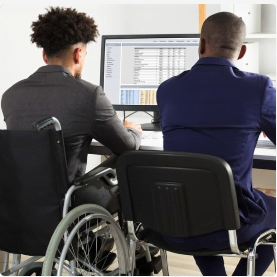By Daniel Orelowitz, MD of Training Force
THE national disability prevalence rate is 7,5% in South Africa, and yet despite this, having a disability is not readily accepted as a normal part of workplace culture. While legislative protection in the workplace for persons with disabilities (PWD) is a good starting point, actually putting the principles of employment equity into play isn’t clear cut.
Identifying and addressing barriers for PWD
Whether physical or mental, noticeable, or ‘invisible’, equity acknowledges that people are different, while narrowing the impact of differences in the workplace in sensitive and practical ways that enable persons with disabilities to integrate effectively and deliver value to the organisation they work for. Stemming from the traditional medical definition of disability, there exists a misplaced emphasis on an individual’s condition and the limitations they may present. Significant barriers to accessibility in the workplace for PWD are usually attitudinal, organisational, architectural, technological and include a lack of adequate information and communication.
Legislative framework for inclusion
Although reasonable accommodation is legally mandated, most workplaces are still inaccessible for PWD because people fail to understand the extent and methods of handling reasonable accommodation within the workplace. Many employers mistakenly assume that reasonable accommodation will come at a great expense, when in fact many accessibility measures can be implemented easily and at minimal cost. Skills development is one of the most effective tools available to empower an individual by becoming economically active. Investing in on-going education and training opportunities is essential to close the skills gap and grow the economy.
Creating the right opportunities
Interestingly, the Employment Equity Code of Good Practice on Employment of Persons with Disabilities, South African organisations is mandated to spend 0.3% of their wage bill on skills development for disabled employees as part of their BBBEE Spend on their scorecard. While certain disabilities might exclude individuals from working in certain jobs, purely from a practical perspective (for example, someone in a wheelchair isn’t necessarily suited to working at heights), businesses need to realise that disabilities do not prevent people from excelling in other roles if given the right opportunity and the right skills development training.
Facilitating real change
Here, training providers can play a pivotal role in connecting PWDs with employers in a manner that addresses stigmas attached to disability. Through learnership programmes, PWDs can gain qualifications and skills in a manner that overcomes traditional barriers by taking into consideration their unique skills and talents. Training providers can assist businesses in becoming accessible and welcoming to PWDs – from sensitivity training to mentorship programs that help PWDs with on-boarding and integration into the workplace. Learners can then gain practical experience in their chosen fields at companies that are geared toward helping them achieve their potential.
